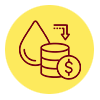Home » Industries Served » Food, Beverage & Agribusiness
Producers, processors, distributors, wholesalers, retailers, and food service companies that deal with consumable food products and beverages are all included in the food, beverage, and agriculture sectors. The food service sector is showing signs of steady growth and is in its mature stage. The processing of meat, fish, and dairy products is strictly regulated in Saudi Arabia because of the possibility of adulteration and contamination. When products are first being manufactured and processed, regulations are strict; however, they loosen as they approach retailers.
During recessions, the food, beverage, and agricultural sectors are defensive and have little volatility. Growing health consciousness has led to a change in perceptions about organic, regionally produced, and healthier specialized foods. Furthermore, immigration keeps up the demand for kosher, halal, and ethnic foods. In the future, this trend will persist, and businesses that prioritize nutritious foods and better food substitutes will expand more quickly than the industry median.
Similar to the consumer retail sector, the food and agriculture sectors are influenced by variables that change the cost of raw materials and consumer purchasing patterns. More precisely, consumer confidence, consumer spending, commodity prices, and the agricultural price index all affect the food, beverage, and agriculture sectors.

The monthly variations in the prices that farmers earn from the sale of their agricultural products are tracked by the FPPI. At every point in the food and beverage supply chain, price increases are directly passed on to consumers, hence a gain in this index would inevitably result in higher industry profits.

Consumer confidence is a good predictor of future saving and spending habits. Spending generally rises in periods of increased consumer confidence. This would result in higher spending on both non-discretionary and essential food purchases, raising demand overall.

Increases in disposable income, which is defined as the money left over after necessary expenses are paid, would inevitably lead to a rise in demand from industry participants, particularly from downstream food manufacturers and retailers like take-out and restaurants, since consumers would have more money to spend on recreational food and drink.

The food, beverage, and agricultural industries depend on commodities like oil and gas since these raw materials are needed for the manufacture, acquiring, and selling of industry products. Higher commodity prices would therefore be passed on to the client, boosting the industry's overall profitability.

Elevated rivalry and low entry barriers define the food manufacturing and agriculture sector. Because of the steady need for staple foods and grocery items, the industry is defensive and performs better in recessions than other discretionary consumer market verticals. Selling such businesses can frequently be difficult due to the industry’s low profitability and intense competition. Being the top private market M&A advisory firm in KSA, BBMA is aware of how significant a choice selling a company is. A committed business owner looks to sell their company to a capable buyer who can carry on the company’s tradition in addition to maximizing the value from the transaction.
With a wealth of experience in deal negotiation, BBMA has worked on more than 100 valuation and M&A consulting engagements in the food and agribusiness industry. Your company will receive expert guidance from our advisory team as it navigates the sell-side M&A process.
It’s critical for entrepreneurs and business owners considering a possible sale to comprehend the critical elements unique to the food manufacturing and agriculture sectors that could influence the probability of a deal. These are the kinds of things that make a business appealing to investors and buyers.
Whether it’s a sale or a valuation, our team can offer resources and experience that are only available at larger companies, together with the individualized attention of our M&A Advisory team. Reach out to one of our advisors by contacting us right now.
Our Process





Sign up for Alerts, New listings, News and Updates.